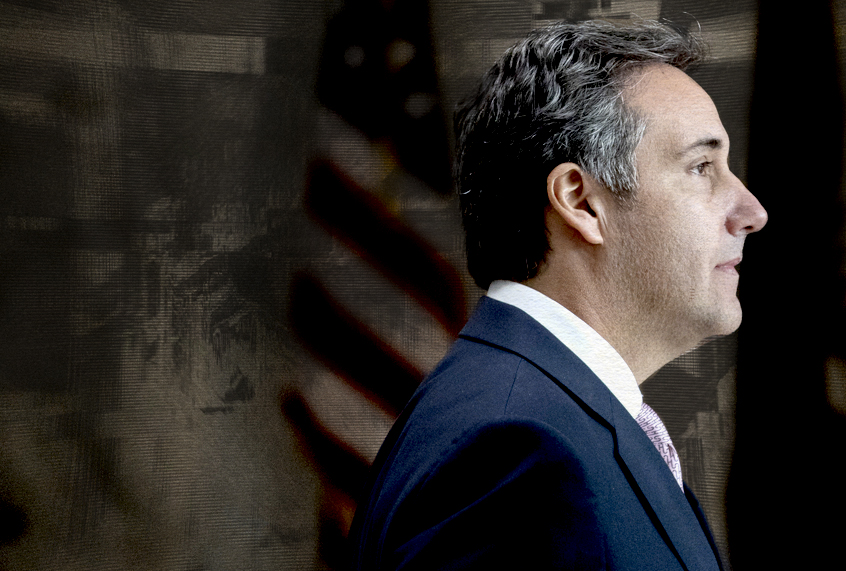President Trump made a statement on Monday that many people in American never thought they’d hear from him. He said, “It’s an attack on our country, in a true sense. It’s an attack on what we all stand for.”
Unfortunately, the president wasn’t talking about the interference in our democratic election process in 2016. He was referring to the FBI warrants served on his attorney Michael Cohen’s office and two residences that morning, in which agents seized documents reportedly pertaining to suspected wire fraud, bank fraud and campaign finance violations. Trump believes that such an investigation is an attack on America because he believes it is an attack on him.
To paraphrase a quip from the great Molly Ivins, it sounded better in the original French: L’état, c’est moi.
Trump was very worked up, so worked up that he spent the first 15 minutes or so of a televised photo-op with his national security team and the Joint Chiefs railing against Special Counsel Robert Mueller, the Department of Justice, Attorney General Jeff Sessions, Hillary Clinton and Deputy Attorney General Rod Rosenstein, among others.
It wasn’t the first time we’ve seen this president deliver a petulant and angry denunciation of the Russia probe. But to do it as he sat around a table with the military brass, for a meeting called to decide how to respond to a chemical warfare attack, was stunningly narcissistic even for him. The cameras didn’t show much of his team, but one can imagine how they felt being led by such a man. It’s not hard to imagine how most people in the country felt either. No one will ever describe Donald Trump as a leader who shows grace under pressure.
These warrants were issued by the U.S. attorney for the Southern District of New York (a Trump appointee, by the way), based on a referral from the special counsel’s office. Nobody is quite sure exactly why it happened that way. Some have speculated that this is about the Stormy Daniels case, and therefore far afield from Mueller’s mandate, while others have suggested that Mueller passed this to a federal prosecutor to avoid the accusation that he crossed Trump’s (nonexistent) red line.
At this point, all we can say for sure is that all warrants targeting an attorney go through an extraordinary process all the way up the line in the Department of Justice and are subject to extreme scrutiny by the magistrates who must approve them. These are all lawyers, and by training and instinct they are protective of attorney-client privilege. The U.S. Attorneys’ Manual identifies six additional safeguards to ensure that the Department of Justice doesn’t violate it in cases where an attorney is the subject of an investigation.
This particular lawyer is also the president’s personal attorney, so it’s fair to assume investigators were careful to demonstrate probable cause that Cohen had committed a crime in the course of representing his client and that he would be likely to destroy the evidence if they simply subpoenaed his records. That may be the most extraordinary aspect of this entire event, although if you look at the way Cohen has talked and behaved over the years, it’s not hard to see why someone might assume he could do that. Nonetheless, any prosecutor would have to be aware of the political implications, and think long and hard about whether or not he or she had the goods to pursue such a case.
Nobody should have been all that surprised by this, least of all Michael Cohen himself. He’s at the center of the Stormy Daniels case, and the president unhelpfully exacerbated his problems last Friday on Air Force One when he referred questions about the alleged $130,000 payment to “my attorney Michael Cohen.” (There is some speculation that he and Cohen believed they’d be protected by attorney-client privilege; if so, they were wrong.) But while that probably didn’t help, it’s almost certainly the reason Cohen’s office and homes were raided on Monday. There’s plenty of reporting to indicate that Cohen has been in the crosshairs for quite some time.
The Washington Post reported back in March that Mueller’s office was interrogating witnesses about Cohen’s negotiations during the presidential campaign to build a Moscow Trump Tower. Reportedly, investigators were also exploring the odd story about the Russia-friendly “peace proposal” for Ukraine that Cohen received about a week after Trump was inaugurated.
Last week McClatchy reported that Mueller’s team had shown up unannounced at the home of an unnamed Trump Organization business associate, “armed with subpoenas compelling electronic records and sworn testimony.” This person had reportedly worked with the company on overseas deals for years, and investigators were specifically interested in interactions with Cohen.
According to The New York Times on Monday, Mueller is also interested in a $150,000 payment paid to the Trump Foundation by a Ukrainian oligarch for a brief speech Trump gave during the presidential campaign. (You will recall that Trump has a way of pocketing money collected for his foundation.) That deal was allegedly solicited by Michael Cohen. This apparently doesn’t pertain to the warrants issued on Monday but rather the subpoenas issued to the Trump Organization last month.
Whether various federal officials are tracking Cohen’s activities overseas, like the Moscow tower or the Ukraine speech, or the hush money paid to Stormy Daniels, it looks as though all roads lead to President Trump’s personal lawyer. Considering that it’s well understood whom Michael Cohen is working for every minute of every day, that means the road dead-ends at 1600 Pennsylvania Avenue.

